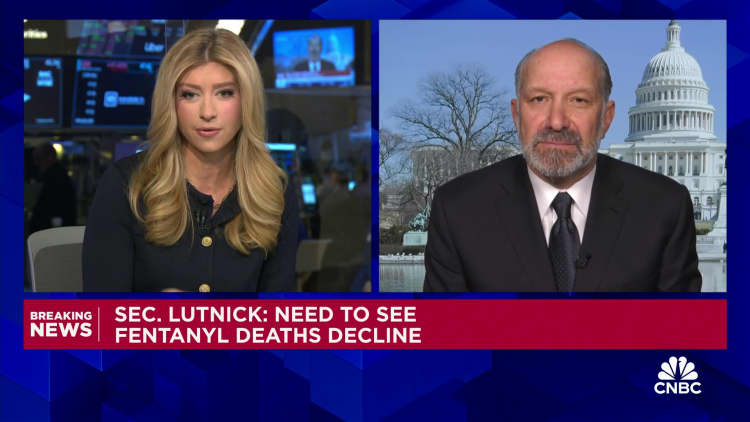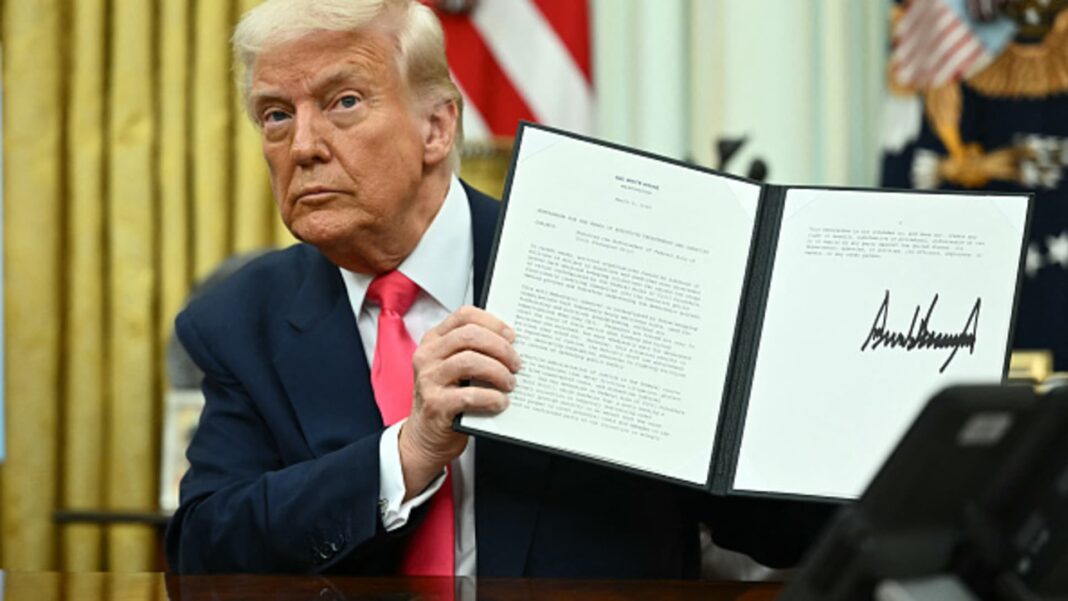“Market Meltdown: Trump’s Tariffs Trigger Global Economic Storm – As tensions between the US and its trading partners continue to escalate, investors are reeling from the consequences. The Dow Jones Industrial Average plummeted to its lowest level since 2020, with the biggest one-day decline since the COVID-19 pandemic. The ripple effects of President Trump’s tariffs are being felt across the globe, as business leaders and policymakers scramble to respond to the uncertainty and volatility that’s gripping the markets.”
The Impact of Trump Tariffs on Business

Tariffs imposed by the Trump administration have sent shockwaves across the global economy, with business leaders expressing concerns over rising costs and the inability to pass higher prices on to consumers. According to multiple surveys, including the ISM manufacturing survey for February, business executives are struggling to cope with the impact of tariffs on their operations.
A purchase manager in the machinery sector noted that “the incoming tariffs are causing our products to increase in price. Sweeping price increases are incoming from suppliers. Most are noting increases in labor costs.” This sentiment is echoed across various sectors, with companies facing weak demand and reduced pricing power.
Tariff Uncertainty Continues to Weigh on Business Executives
The uncertainty surrounding tariffs has led to a surge in costs, with companies struggling to pass these costs on to consumers. The ISM services survey revealed that business leaders are expecting price increases, which could have a negative impact on profitability. A technology manager noted that “tariffs are going to have a ripple down effect that could severely harm our business.”
The Federal Reserve’s Beige Book highlighted over 50 mentions of tariffs or trade policy concerns, with business leaders expressing difficulty setting prices and ambiguity around costs. The Atlanta Fed reported that “many contacts reported difficulty setting prices and noted ambiguity around costs, largely as a result of uncertain international trade policy.”
Trade Policy Concerns Permeate Multiple Sectors
- Purchasing managers in the machinery sector reported increases in labor costs and sweeping price increases from suppliers.
- Technology managers and representatives from the professional, scientific and technical services field expressed concerns over tariffs.
- The ISM services survey revealed sentiment that price increases are coming, with potentially negative impacts on profitability.
Chris Williamson, chief business economist at S&P Global Market Intelligence, noted that the firm’s monthly survey showed services activity expanding but at a much slower pace, with business executives concerned over tariffs. “Adding to the gloomier picture in February was a sharp rise in costs, which companies were often unable to pass on to customers due to weak demand,” he said.
Economic Indicators Show Uncertainty’s Effect on Business
The economic indicators are clear: uncertainty surrounding tariffs is having a significant impact on business. The Federal Reserve’s Beige Book highlighted the concerns of business leaders, with many reporting difficulty setting prices and ambiguity around costs. The Atlanta Fed noted that “most firms said they expected to pass through the bulk of any additional costs to customers.”
While this reduced pricing power may be good news for inflation, it’s potentially bad news for profitability. As Williamson noted, “while this reduced pricing power is good news for inflation, it’s potentially bad news for profitability.”
Business Strategy in Response to Tariffs
Business leaders are facing a significant challenge in responding to the impact of tariffs on their operations. With weak demand and reduced pricing power, companies are struggling to pass on costs to consumers.
Passing on Costs to Customers: A Challenge
Companies are facing a difficult task in passing on costs to customers. With weak demand and reduced pricing power, business executives are expressing concerns over the impact of tariffs on profitability. A technology manager noted that “tariffs are going to have a ripple down effect that could severely harm our business.”
Chris Williamson, chief business economist at S&P Global Market Intelligence, noted that the firm’s monthly survey showed services activity expanding but at a much slower pace, with business executives concerned over tariffs. “Adding to the gloomier picture in February was a sharp rise in costs, which companies were often unable to pass on to customers due to weak demand,” he said.
- Business executives are expressing concerns over the impact of tariffs on profitability.
- Companies are facing weak demand and reduced pricing power.
- The Federal Reserve’s Beige Book highlighted over 50 mentions of tariffs or trade policy concerns.
As the economic indicators continue to show the impact of uncertainty on business, companies are being forced to re-evaluate their strategies in response to tariffs. With the global economy facing significant challenges, business leaders must be prepared to adapt to the changing landscape.
Adapting to New Tariffs: Strategies and Challenges
As the ripple effects of Trump’s tariffs continue to spread across the globe, companies are working diligently to assess the impact on their business and develop strategies to mitigate the challenges that come with these new tariffs.
Representatives from various sectors, including manufacturing and services, have highlighted the need for businesses to adapt quickly to changing market conditions in order to remain competitive. According to a purchase manager in the machinery sector, “The incoming tariffs are causing our products to increase in price. Sweeping price increases are incoming from suppliers. Most are noting increases in labor costs.”
This sentiment is echoed by business leaders across multiple sectors, who are expressing concerns over the impact of tariffs on their profitability. As reported in the ISM services survey, “Tariffs are going to have a ripple down effect that could severely harm our business.” This concern is further exacerbated by the inability to pass higher prices on to consumers, leading to decreased sales and revenue.
A Shift in Consumer Behavior: Implications for Business
The introduction of new tariffs is not only affecting businesses but also leading to a shift in consumer behavior. With the inability to pass higher prices on to consumers, businesses are required to re-evaluate their pricing strategies and adapt to the changing market landscape.
According to Chris Williamson, chief business economist at S&P Global Market Intelligence, “Adding to the gloomier picture in February was a sharp rise in costs, which companies were often unable to pass on to customers due to weak demand.” This reduced pricing power is good news for inflation, but it’s potentially bad news for profitability.
As a result, businesses are required to think creatively and develop innovative pricing strategies that balance the need to maintain profitability with the need to remain competitive in the market. This may involve exploring alternative pricing models, such as value-based pricing or subscription-based models.
Implications for the Economy and Market
Tariffs: A Ripple Effect on the Economy
The impact of tariffs is not limited to the manufacturing sector, with concerns expressed across multiple sectors. As reported in the Federal Reserve’s periodic Beige Book, “Many contacts reported difficulty setting prices and noted ambiguity around costs, largely as a result of uncertain international trade policy.”
The ripple effect of tariffs may lead to decreased economic growth and investment, as businesses become increasingly cautious about investing in new projects and hiring new employees. This caution is reflected in the reduced pace of services activity, as reported by the ISM services survey.
Furthermore, the uncertainty surrounding Trump’s trade policy has led to market volatility, making it challenging for investors and business leaders to make informed decisions. As a result, there is a growing need for businesses to adapt to changing market conditions and navigate through uncertainty.
Market Volatility: A Response to Uncertainty
The uncertainty surrounding Trump’s trade policy has led to market volatility, with investors and business leaders struggling to make sense of the changing market landscape.
According to the Washington Post, the Dow Jones Industrial Average suffered its biggest plunge since 2020, with the S&P 500 also experiencing a significant decline. This market volatility is a response to the uncertainty surrounding Trump’s trade policy, which is making it challenging for investors and business leaders to make informed decisions.
As a result, there is a growing need for businesses to adapt to changing market conditions and navigate through uncertainty. This may involve exploring alternative investment strategies, such as diversifying portfolios or investing in emerging markets.
A Call to Action: Supporting Businesses Impacted by Tariffs
As the impact of tariffs continues to spread across the globe, there is a growing need for governments and regulatory bodies to provide support to businesses impacted by tariffs.
This support can take various forms, including subsidies or tax breaks, to help companies adapt to changing market conditions. According to the ISM services survey, “Business seemed to pop after the election, but uncertainty after the election seemed to take the ‘wind out of our sales,’ with uncertainty again increasing.”
By providing support to businesses impacted by tariffs, governments and regulatory bodies can help to mitigate the negative impact of tariffs and support economic growth. This support is particularly important for small and medium-sized businesses, which may not have the resources to adapt to changing market conditions.
As a result, there is a growing need for governments and regulatory bodies to take action and provide support to businesses impacted by tariffs. This support is critical to mitigating the negative impact of tariffs and supporting economic growth.
Conclusion
As the global economic landscape continues to grapple with the aftershocks of President Trump’s tariffs, the reality of the situation is becoming increasingly clear: the ripple effects of this trade war are far-reaching and multifaceted. The article highlights the staggering plummet of Wall Street, with the Dow Jones Industrial Average plummeting to its lowest point since 2020, underscoring the devastating impact on the global economy. The tariffs imposed by the US have sparked a retaliatory wave of measures from trading partners such as China, the European Union, and Japan, all of which are seeking to protect their domestic industries and economies.
The significance of this trade war cannot be overstated. The tariffs imposed by Trump have not only crippled American businesses, but have also had a profound impact on global trade patterns, leading to a sharp increase in protectionism and a decline in international cooperation. The long-term implications of this trade war will be far-reaching, with potentially devastating consequences for global economic growth and stability. As the world grapples with the aftermath of this trade war, one thing is clear: the era of globalization is under threat, and the consequences of this will be felt for generations to come.
As the global economy teeters on the brink of chaos, one question remains: can the damage be undone? The answer, for now, remains uncertain. But one thing is clear: the tariffs imposed by President Trump have sent a stark message: the era of free and open trade is coming to an end. The future of global commerce hangs in the balance, and the consequences of this trade war will be felt for years to come. As the world waits with bated breath to see how this crisis will be resolved, one thing is certain: the impact of Trump’s tariffs will be felt for a long time to come.
